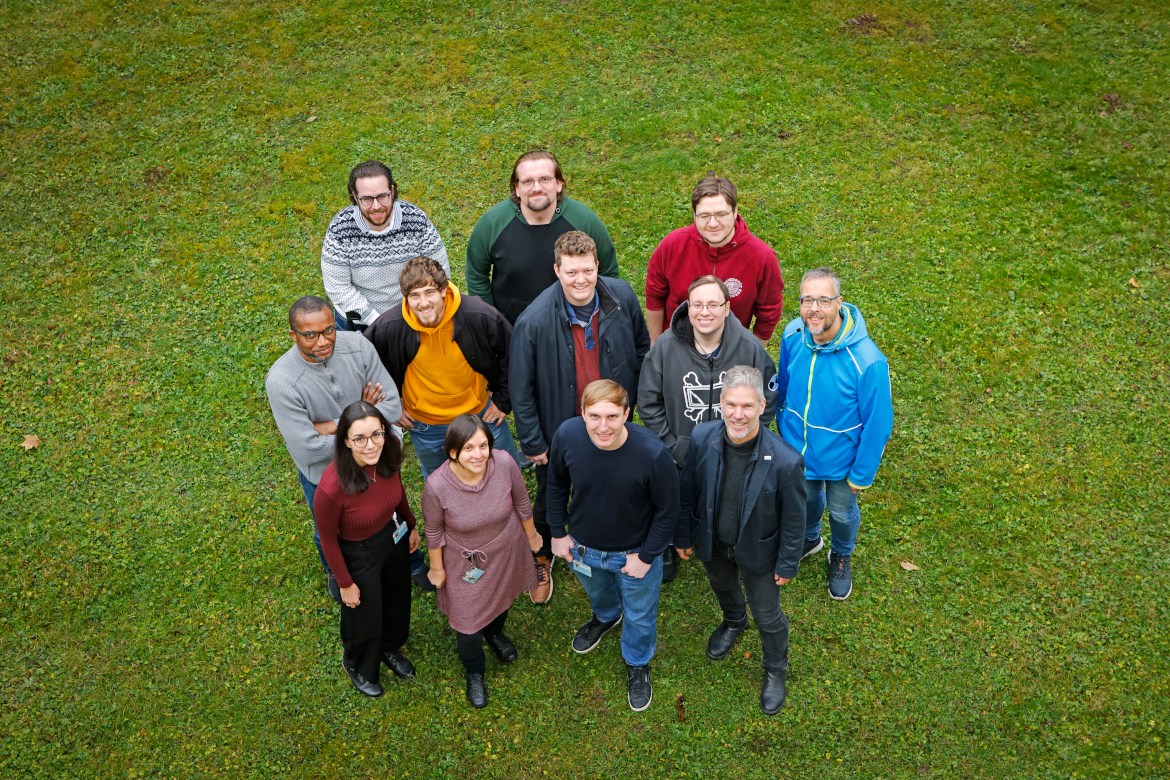Translational Research Informatics
Department of Medical Informatics
Addressed Issues
Our work group explores the researcher’s needs for infrastructure in translational research. We focus on procedures of data integration, data stewardship, data visualization and legal aspects of medical research. This is strengthened by collaborations with various national and international research groups that collect a wide range of data types. Applying international standards and tools, requirements-driven solutions are being sketched, discussed, iteratively implemented, and evaluated. Methodological core area is the coverage, analysis and annotation of data sources and workflows as well as their assessment, curation and integration. Furthermore, we focus on tools for coverage and visualization of data (“Bring the analysis to the data.”) In this, current tools are applied and customized that allow the simple embedding and use of R-Scripts on proprietary data sets – next to more advanced visualization capabilities. The systematic analysis of data sources, their incremental improvement and tools to discuss the data with the different stakeholders are essential steps towards a sustainable data stewardship along the FAIR guiding principles of data management.
Research Target
Integral for our research approach is the close cooperation with pre-clinical and clinical researchers. The set of tools and methods grows subsequently by participating directly in interdisciplinary translational research projects in different clinical areas as well as methodological areas in biomedical informatics and social sciences; e.g. MyPathSem (BMBF), MTBReport (VW Stiftung) or SFB1002 (INF), SFB1190, SFB 1286. All group members are involved in teaching, internship and management of bachelor-, master- and PhD-theses. A vivid national expertise exchange takes place via the German medical Informatics association (GMDS) and the TMF – Technology, Methods, and Infrastructure for Networked Medical Research as well as in cross-sectional projects in huge funding initiatives like e:med or the MI-Initiative. International exchange in the work group’s core areas is practiced e.g. through hosting of international guest researchers, active participation in the works and events of the i2b2 tranSMART Foundation and its antecedent organizations as well as in international research data management networks (e.g. RDA).
Operational Targets
Identifying requirements for improving biomedical research, setting up, customizing and testing adequate infrastructure components.
Preparing the GCP-validation and go-live through sustainable service partners like the UMG MeDIC.
Team
Our group is led by Prof. Dr. Ulrich Sax, an experienced medical informaticist with a strong international background in Biomedical Informatics, Computer Science and long term experience in operating medical computing centers. The group comprises several computer scientists with a solid background in biomedical informatics and project experience. The team is continuously supported by student assistants. Additionally, internships and bachelor’s and master’s theses are being motivated, designed and supported by this work group. Furthermore, the team members are involved in several interdisciplinary research projects and work groups of the GMDS and TMF.
List of Projects
KFO 5002 (2020 to 2024)
Pancreatic ductal adenocarcinoma (PDAC) remains a major challenge in cancer medicine. The aggressive tumor biology and remarkable resistance to conventional anti-tumor treatments are reflected in a 5-year PDAC survival rate of less than 8%. Despite significant scientific and clinical efforts the dismal prognosis of PDAC has remained unchanged for almost 30 years, and PDAC has been predicted to become the second leading cause of cancer related death within this decade.
The Clinical Research Unit 5002 (CRU 5002) focuses on defined molecular subgroups of PDAC and explores subtype-specific genome dynamics and their implications on PDAC progression and therapy resistance. They believe that our findings can provide unique and novel avenues to refine PDAC treatment strategies towards stratification-based precision medicine, thus improving the outcome of PDAC patients.
MTB-Report (2020 bis 2023)
MTB-Report: An automated data integration platform for interpreting genomic data and reporting treatment options in molecular tumor boards.
Aims: In the MTB-Report project we aim to develop a tool to support the decision finding in a molecular tumor board (MTB). Biomarkers and other omics data from the patient will be compared to a multitude of available data bases in order to find case studies with a parameter set equivalent to the patient’s one. Based on tumor type and certainty of the study an evidence level is assigned and used to propose the most relevant to the MTB in form a short report. For access to the clinical data and to ensure data privacy the tool will be embedded in the IT-infrastructure. Clinical experts will define use cases for an optimal usage of the reporting tool and will validate the results.
MTB-Report Project Homepage at Inst. of Bioinformatics
NFDI4Health Task Force COVID-19 (2020 to 2023)
Better understanding the COVID-19 outbreak and its consequences through integrated and harmonized research efforts
NMDR (2016 bis 2029)
NMDR: Further Development and Establishment of a National Metadata Repository in Medical Research
Aims: Das strategische Ziel dieses Projekts ist die Etablierung eines kollaborativen, qualitätsgesicherten, neutralen, dauerhaften, freien und zugreifbaren Metadaten-Registers für die klinische und epidemiologische Forschung in Deutschland. Diese Kategorien sind das wesentliche Ergebnis der Anforderungsanalyse durch Befragung von 30 verschiedenen Anwendern im Rahmen des TMF-Projekts „Community-Evaluation MDR“. Von dem geplanten Vorhaben profitieren alle klinischen Forscher, die wissenschaftsinitiierte Studien, Register oder Kohorten planen und Daten hoher Qualität erheben wollen. Zugleich werden diese Punkte bislang von keinem existierenden System adressiert. Im Laufe des Projekts werden die folgenden wesentlichen Ergebnisse erzielt: Konzept und Methode zur Abstimmung von Kerndatensätzen, Pool von Fachexperten zur Kuration von Datenelementen, Konzept zur Verwaltung und Lizensierung von Datenelementen, Verbessertes Softwarewerkzeug, Konzept einer Schnittstelle (API) für den Zugriff auf CDMS.
MyPathSem (2016 bis 2021)
MyPathSem: A knowledge base for generating patient-specific pathways for individualized treatment decisions in clinical applications
Aims: A data integration platform for generating patient-specific signaling pathways for personalized treatment decisions in clinical applications (PI WP 2, Infrastructure clinical applications). Förderer: BMBF, i:DSem.
SFB1002 Research Data Platform (2016 to 2024)
Sonderforschungsbereich 1002: Modulatorische Einheiten in Herzinsuffizienz (SFB 1002); Enhancing the CRC 1002 research data platform for integrated and sustainable research data management (TP INF, 2. Förderperiode).
SFB1190 Research Data Platform (2016 to 2023)
Sonderforschungsbereich 1190: Transportmaschinerien und Kontaktstellen zellulärer Kompartimente
Aims: The compartmentalization of cells ensures a highly specific distribution of nucleic acids, proteins and metabolites. At the same time, intracellular compartments must communicate and exchange molecules. Two major systems enable exchange between compartments: compartmental gates and contact sites. While compartmental gates mediate the selective partitioning of molecules between cytoplasm and organelles or within a membrane, contact sites represent direct physical connections between compartment-enclosing membranes. Thus, within living cells, compartmental gates and contact sites represent two complementary systems, which functionally cooperate or directly interact with each other to coordinate compartmentalized processes. This SFB-initiative is committed to addressing the role of compartmental gates and contact sites in cellular organization and physiology. We aim to understand how they achieve a selective distribution of molecules and thus functionally define and diversify cellular compartments.
Contact

contact information
- telephone: +49 551 3961529
- e-mail address: ulrich.sax(at)med.uni-goettingen.de
- ORCiD: https://orcid.org/0000-0002-8188-3495

contact information
- telephone: +49 551 3961539
- e-mail address: harald.kusch(at)med.uni-goettingen.de
- ORCiD: https://orcid.org/0000-0002-9895-2469
This might also interest you
